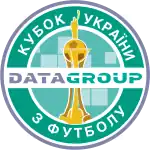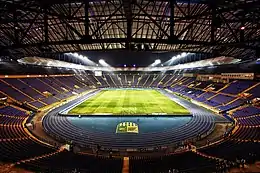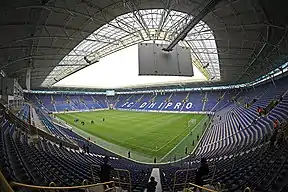| Founded | 1992 |
|---|---|
| Region | |
| Number of teams | 45 |
| Qualifier for | UEFA Europa League (UEFA Cup Winners' Cup before 1999) |
| Domestic cup(s) | Ukrainian Super Cup |
| Current champions | Dynamo Kyiv (13th title) |
| Most successful club(s) | Dynamo Kyiv Shakhtar Donetsk (13 titles each) |
| Website | Official website |
The Ukrainian Cup (Ukrainian: Кубок України) is an association football national knockout cup competition run by the Ukrainian Association of Football. The competition is conducted almost exclusively among professional clubs.[1] Since the 2003–04 season, the Cup winner qualifies to play the Ukrainian Premier League winner for the Ukrainian Super Cup.

Current format and eligibility criteria
For the competition are eligible first teams of all Ukrainian professional clubs. Beside professional clubs, to the competition is also invited both finalists of the Ukrainian Amateur Cup preceding season. If both finalists obtained professional status (admitted to the Second League (tier 3)), then two better performers of the amateur competition are invited. Beside the initial draw, all the draws are conducted the next day after all the matches of the round is played.
The format of this competition consists of two phases: a qualification phase with two rounds followed by the competition proper (four rounds and the final game) when all Premier League (tier 1) clubs enter the competition.[2] The Ukrainian Association of Football organizes the draw in qualification phase by geographic principles, so to accommodate "smaller" clubs (in lower tiers) by reducing their travel time. Often times the very first qualification round involves matches between the amateur teams and either the newly admitted professional clubs or clubs that struggled in prior season. For the next couple of qualification rounds enter clubs of the Second League (tier 3) and First League (tier 2). The final is usually taken place at the Olimpiyskiy National Sports Complex, however due reconstruction of the stadium to prepare to the UEFA Euro 2012, the final had been played at other venues temporarily. After that this tradition has ceased.
Past variations of the competition involved a home-away type of elimination, but the Ukrainian Cup has since changed to a single game per round format. In recent years, a conditional replay game was introduced to avoid penalty shootouts. Cup draws may be conducted for two consecutive rounds, but usually occur before each following round. The lower division teams are usually awarded the home-field advantage (or the first leg at home in case of a two-leg round).
History

Ukrainian Cup competitions have been conducted since at least 1936.[3] The first of season in 1936 was officially known as Spring Championship, the decision about which was adopted by the All-Ukrainian football Section.[3] Initially called also as the Spring Championship, sometime during the 1937 season the tournament was renamed by mass media as the Cup of the Ukrainian SSR (Ukrainian: Кубок УРСР, Kubok URSR).[3] The official change was adopted by the Republican Football Conference only in April 1938.[3] To commemorate the event, in 1979 the Soviet Ministry of Communication released an envelope with depiction of the trophy (see the picture).[3] The streamer on top of a picture reads in Russian language "The first Cup of Ukraine in football" (Russian: Первый кубок Украины по футболу, Pervyi kubok Ukrainy po futbolu), while the same thing is written at the picture's footer in Ukrainian language (Ukrainian: Перший кубок України з футболу, Perhyi kubok Ukrayiny z futbolu).
In 1944 as compensation for the canceled republican championship there was conducted next tournament in September.[3] The decision to conduct the tournament was adopted on 6 September 1944 by the Central Committee of the Communist Party of Ukraine.[3] The tournament was also known as Ukrainian Cup[4] or Ukrainian Bowl (Ukrainian: Келих УРСР, Kelykh URSR).[3] After World War II, subsequent editions of the national Cup were downgraded to a republican cup competition that was limited to lower league clubs and teams participating in the KFK competitions (amateurs). The timeframe of the tournament also shifted from spring time to fall (end of calendar year).[3] Already in 1948 FC Lokomotyv Kharkiv as one of the Soviet Top League clubs from Ukraine chose not to participate in the Ukrainian Cup competition.[3] In 1959 the tournament was cancelled completely and replaced with Football Cup among collective of physical culture (a predecessor to Ukrainian Amateur Cup).
In 1970s the Ukrainian Cup competitions were revived and conducted parallel to Ukrainian Amateur Cup for several seasons. In second half of 1970 the tournament was discontinued once again until 1990.
The first Cup competition in independent Ukraine had an unlikely winner, similar to the championship of 1992. The main contender, Dynamo Kyiv, settled for a draw in its first game at home against a team that was an amateur club in Soviet times, Skala Stryi. In the following quarter-finals round, the team faced defeat by Torpedo Zaporizhia. Eventually that competition was won by Chornomorets Odesa.
In 2008, the Football Federation of Ukraine signed a contract with the company Datagroup,[5] naming the company as the main sponsor of the tournament for the next four years. Datagroup introduced its new version of the cup trophy,[6] the first winner of which became Shakhtar Donetsk.[7] In 2010, there was an attempt to launch an independent website for the competition, which was active for only a couple of months.
Venues
The Ukrainian Cup finals are played most often at the main countries association football venue, Olympiyskiy National Sports Complex. Since 2008 and establishing of the Ukrainian Premier League, the final games started to be conducted at alternative stadiums among which most often was used the Metalist Oblast Sports Complex and the Dnipro Arena.
Finals
Top scorers of finals
| No | Name | Club(s) | Goals |
|---|---|---|---|
| 1 | Dynamo Kyiv | 4 | |
| Shakhtar Donetsk | |||
| 3 | Shakhtar Donetsk | 3 | |
| 4 | Dynamo Kyiv | 2 | |
| Dynamo Kyiv | |||
| Shakhtar Donetsk | |||
| Dynamo Kyiv | |||
| Dynamo Kyiv | |||
| Shakhtar Donetsk | |||
| Shakhtar Donetsk | |||
| 10 | 33 players | 1 | |
Performances
Achievements of clubs since 1992[11][12]
| Team | Winners | Winning years | Runners-up | Runners years | Finals |
|---|---|---|---|---|---|
| Shakhtar Donetsk | 13 | 1995, 1997, 2001, 2002, 2004, 2008, 2011, 2012, 2013, 2016, 2017, 2018, 2019 | 6 | 2003, 2005, 2007, 2009, 2014, 2015 | 19 |
| Dynamo Kyiv | 13 | 1993, 1996, 1998, 1999, 2000, 2003, 2005, 2006, 2007, 2014, 2015, 2020, 2021 | 5 | 2002, 2008, 2011, 2017, 2018 | 18 |
| Chornomorets Odesa | 2 | 1992, 1994 | 1 | 2013 | 3 |
| Tavriya Simferopol | 1 | 2010 | 1 | 1994 | 2 |
| Vorskla Poltava | 1 | 2009 | 1 | 2020 | 2 |
| Dnipro Dnipropetrovsk | – | — | 3 | 1995, 1997, 2004 | 3 |
| Karpaty Lviv | – | — | 2 | 1993, 1999 | 2 |
| CSKA Kyiv | – | — | 2 | 1998, 2001 | 2 |
| Metalurh Donetsk | – | — | 2 | 2010, 2012 | 2 |
| Zorya Luhansk | – | — | 2 | 2016, 2021 | 2 |
| Metalist Kharkiv | – | — | 1 | 1992 | 1 |
| Nyva Vinnytsia | – | — | 1 | 1996 | 1 |
| Kryvbas Kryvyi Rih | – | — | 1 | 2000 | 1 |
| Metalurh Zaporizhya | – | — | 1 | 2006 | 1 |
| Inhulets Petrove | – | — | 1 | 2019 | 1 |
- Note: Defunct teams marked in Italics.
All-time table
Top-10. All figures are correct through the 2017–18 season.[13]
| PL | Team | Seasons | GP | W | D | L | GS | GA | Pts | Achievement |
|---|---|---|---|---|---|---|---|---|---|---|
| 1 | Shakhtar Donetsk | 27 | 151 | 111 | 21 | 19 | 346 | 106 | 354 | champion |
| 2 | Dynamo Kyiv | 27 | 144 | 112 | 16 | 16 | 345 | 90 | 352 | champion |
| 3 | FC Dnipro | 27 | 117 | 68 | 17 | 32 | 188 | 105 | 221 | finalist |
| 4 | Tavriya Simferopol | 24 | 87 | 49 | 15 | 23 | 141 | 97 | 162 | champion |
| 5 | Karpaty Lviv | 27 | 89 | 45 | 12 | 32 | 130 | 96 | 147 | finalist |
| 6 | Vorskla Poltava | 27 | 84 | 44 | 12 | 28 | 113 | 97 | 144 | champion |
| 7 | Chornomorets Odesa | 27 | 92 | 44 | 12 | 36 | 148 | 99 | 144 | champion |
| 8 | Volyn Lutsk | 27 | 84 | 42 | 8 | 34 | 141 | 128 | 134 | semi-finalist |
| 9 | Metalurh Zaporizhia | 27 | 80 | 40 | 11 | 29 | 119 | 94 | 131 | finalist |
| 10 | Metalurh Donetsk | 20 | 70 | 37 | 10 | 23 | 107 | 91 | 121 | finalist |
Competition people
Managers
| Manager | Club(s) | Wins | Winning years |
|---|---|---|---|
| Shakhtar Donetsk | 7 | 2003–04, 2007–08, 2010–11, 2011–12, 2012–13, 2015–16 | |
| Dynamo Kyiv | 2020–21 | ||
| 3 | 1997–98, 1998–99, 1999–2000 | ||
| Chonomorets Odesa | 1992, 1993–94 | ||
| Shakhtar Donetsk | 2000–01 | ||
| 2016–17, 2017–18, 2018–19 | |||
| Dynamo Kyiv | 2 | 1995–96, 2004–05 | |
| 2005–06, 2006–07 | |||
| 2013–14, 2014–15 | |||
| 2002–03, 2019–20 | |||
| Dynamo Kyiv | 1 | 1992–93 | |
| Shakhtar Donetsk | 1994–95 | ||
| 1996–97 | |||
| 2001–02 | |||
| Vorskla Poltava | 2008–09 | ||
| Tavriya Simferepol | 2009–10 | ||
Players
| Rank | Player | Year(s) | Games per team(s)[lower-alpha 1] | Games total | |
| 1 | 1995 – 2012 | Advis (2), Podillia (2), CSKA/Arsenal (28), Dnipro (25), Kryvbas (6) | 63 | ||
| 2 | 1993 – 2015 | Dynamo-3 (2), Dynamo (58) | 60 | ||
| 3 | 1993 – 2009 | Karpaty (32), Metalurh Z (7), Volyn (1), Tavriya (13), Zakarpattia (5) | 58 | ||
| 4 | 1992 – 2006 | Tavriya (24), Dynamo (32) | 56 | ||
| 1994 – 2010 | Polihraftekhnika (4), CSKA/Arsenal (34), Dynamo (16), Tavriya (2) | 56 | |||
| 1994 – 2008 | Stal A (3), Shakhtar (48), Illichivets (2), Metalurh D (1), Zoria (1), Komunalnyk (1) | 56 | |||
| 1996 – 2014 | Harai (6), Karpaty (7), Dynamo (2), Kryvbas (4), Dnipro (20), Shakhtar (12), Zoria (2), Tavriya (2), Hoverla (1) | 56 | |||
| 8 | 1992 – 2007 | Shakhtar | 54 | ||
| 2001 – 2018 | Dnipro (42), Dynamo (12) | 54 | |||
| 10 | 1996 – 2013 | Shakhtar (4), Shakhtar (44), Dnipro (2), Arsenal (1), Metalist (2) | 53 | ||
| 11 | 1992 – 2010 | Shakhtar (6), Dynamo (44), Irpin (1) | 51 | ||
| 1994 – 2007 | Prykarpattia (6), Shakhtar (42), Kryvbas (3) | 51 | |||
| 13 | 1993 – 2008 | Dynamo-2 (3), Dynamo (18), Dnipro (2), CSKA/Arsenal (5), Karpaty (11), Kryvbas (7), Metalist (4) | 50 | ||
| The table includes players who played over 50 games in the competition. Players who share number of tallies placed in order of seniority by years and then alphabetical order. Data is through winter of 2020–2021.[14] | |||||
| Rank | Player | Year(s) | Goals per team(s)[lower-alpha 2] | Goals total | |
| 1 | 1996 – 2013 | Shakhtar-2 (2), Shakhtar (22), Metalist (1) | 25 | ||
| 2 | 2000 – 2015 | Dynamo (22), Arsenal (1), Hoverla (1) | 24 | ||
| 3 | 1992 – 2003 | Dnipro (7), Veres (4), Karpaty (5), Kryvbas (3), Metalist (3) | 22 | ||
| 4 | 1994 – 2012 | Dynamo-2 (5), Dynamo (16) | 21 | ||
| 5 | 1992 – 2010 | Shakhtar (1), Dynamo (19) | 20 | ||
| 6 | 1992 – 2008 | Karpaty (15), Metalurh D (2), Rava (1), Halychyna L (1) | 19 | ||
| 2007 – 2017 | Dynamo | 19 | |||
| 8 | 1992 – 2003 | Shakhtar (16), Metalurh Z (1) | 17 | ||
| 9 | 1992 – 2001 | Metalurh Z (1), Tavria (13), Vorskla (2) | 16 | ||
| 2007 – 2015 | Shakhtar | 16 | |||
| 11 | 1993 – 2013 | Shakhtar Pavlohrad (1), Metalurh Z (8), Dnipro (1), Chornomorets (1), Dniester (4) | 15 | ||
| 1996 – 2014 | Dynamo-3 (4), Zirka (1), Zakarpattia (3), Naftovyk (7) | 15 | |||
| 2003 – 2016 | Arsenal (1), Dynamo (14) | 15 | |||
| The table includes players who scored over 15 goals in the competition. Players who share number of tallies placed in order of seniority by years and then alphabetical order. Data is through winter of 2020–2021.[15] | |||||
See also
Notes
References
- ↑ "Football Federation of Ukraine". Football Federation of Ukraine. Retrieved 2016-08-18.
- ↑ "Football Federation of Ukraine". Football Federation of Ukraine. Retrieved 2016-08-18.
- 1 2 3 4 5 6 7 8 9 10 Banyas, V. Forgotten tournaments (Забуті турніри). Ukrainian Premier League. 23 May 2017
- ↑ Banyas, V. Simply Pasha (Просто Паша). Ukrainian Premier League. 4 August 2017
- ↑ Cup of Ukraine got title sponsor (Datagroup website) (in English)
- ↑ Trouphy presentation for the 2010 final (FFU website) (in Ukrainian)
- ↑ Shakhtar won the 2008 Cup final. (in Ukrainian)
- ↑ "RSSSF". Rec.Sport.Soccer Statistics Foundation. Retrieved 2016-08-18.
- ↑ "Soccerway". Soccerway. Retrieved 2016-08-18.
- ↑ 2014 Final of the Ukrainian Cup. Soccerway.
- ↑ Five holders, 13 finalists and 26 semifinalists (П’ять володарів, 13 фіналістів і 26 півфіналістів). Ukrainian Premier League.
- ↑ Statistics by season. Futbol from Dmitriy Troschiy.
- ↑ http://wildstat.ru/p/2102/cht/211/stat/summary Кубок Украины (Суммарная таблица за все годы)
- 1 2 The Ruslan Kostyshyn's "Gvardiya" honours of the Cup (Гвардійська кубкова висота Руслана Костишина). Ukrainian Premier League. 21 December 2020. (in Ukrainian)
- ↑ Among the best top scorers of Ukrainian Cup is Hladkyy and Seleznyov (Серед найкращих кубкових бомбардирів – Гладкий та Селезньов). Ukrainian Premier League. 23 December 2020. (in Ukrainian)
External links
- Football Federation of Ukraine (in Ukrainian)
- Ukrainian Cup (in English)
- Ukraine - Cup Finals. RSSSF (in English)
- Comprehensive information on all official cup tournaments in Ukraine (1992-2007). ukrainianfootball. (in Russian)
- Ukrainian Cup. Ukrainian Football from Dmytro Troshchiy. (in Russian)
- How the FFU works: the Ukrainian Cup is already two years as broken (Как работает ФФУ: Кубок Украины уже два года как поломан). Dinamo.Kyiv. 11 May 2018
- Banyas, V. It is logical to unite in one competition a cup and a championship («…Логічно об’єднати в розіграші Кубка й чемпіонату…»). Ukrainian Premier League. 9 February 2018


